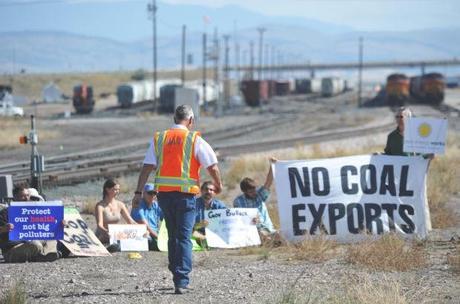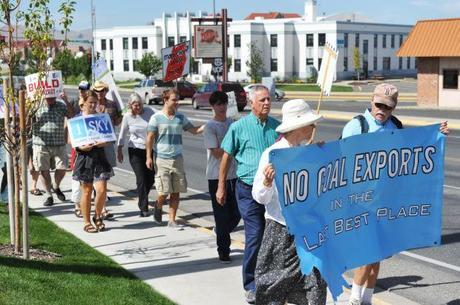
By Derek Brouwer / Independent Record
A group of protesters staged a sit-in along train tracks in Helena on Sunday to oppose a coal development proposal in the state. The act of civil disobedience led city police to issue 13 citations for criminal trespassing.
The protesters sat on a patch of land between railroad tracks crossing North Montana Avenue, about 20 feet from the road. Security personnel with Montana Rail Link, which owns the land, and city police were at the site when protesters arrived.
Police stopped the sit-in after about 10 minutes, and the protesters willingly accepted citations for trespassing. They are scheduled to appear before city court this morning.
“They were symbolically reclaiming that railroad right of way from the coal companies that use it to transport dirty coal,” Nick Engelfried, a rally organizer with the Missoula-based Blue Skies Campaign, said after the event. The Blue Skies Campaign also staged a weeklong protest inside the state Capitol building last summer that led to 23 arrests, according to the group.
“There’s nothing that conveys the moral urgency of an issue like this in the same way that civil disobedience does. It conveys the importance of the issue in a way that holding signs cannot,” Engelfried said.
“I’m here on behalf of my grandchildren, because if the coal from the Powder River and Otter Creek is burned, then my grandchildren and their grandchildren face a very grim future,” protester Lee Metzgar said after receiving his citation.
The sit-in capped a rally of about 60 people through the city that began at Hill Park and marched to the railroad tracks.

The demonstration specifically targeted the proposed Otter Creek mine in southeastern Montana, which is currently under review by the state Department of Environmental Quality and the Montana Land Board.
The mine could produce up to 20 million tons per year, which would make it one of the largest coal mines in the country. Most of that coal would be transported by rail to ports on the pacific coast, also in development, and then shipped to markets in Asia.
“We really see (Otter Creek) as a choke point,” said J.P. Kemmick, event organizer and graduate student at the University of Montana who received a trespassing citation. “If we stop this, we win a lot of battles.”
Protesters cited air and water quality as well as potential social problems arising from industrial developments as primary concerns with the project, in addition to coal’s contribution to global climate change. Kemmick said construction of the mine would be “a climate disaster” and would pollute the state’s “pristine lands.”
“The public safety issues that go with a huge increase in coal traffic will revert back to the public,” Cate Campbell of Frenchtown said. She was also cited Sunday for participating in the sit-in. “The time is now to really stand up for the resources in our beautiful state.”
Jan Siemers of East Helena spoke during the rally of her experience living near rail lines that regularly transport coal. She described “a cloud of coal dust” that she said blew over her neighborhood during period of high winds.
“We are paying the price while they are making the profit,” Siemers said.
Montana Rail Link is not directly associated with the Otter Creek permit application, but protesters said they staged the sit-in on MRL property because the rail line is a key component to the coal development plan. “This is the main rail line that the coal companies want to use to transport coal from Otter Creek to the West Coast,” Engelfried said.
“MRL will be part of the profit-making machine that benefits from the shipment of coal,” Campbell said.
Montana DEQ is reviewing the mining permit application for Otter Creek submitted by St. Louis-based Arch Coal Inc. Environmental impact studies for the mine and associated Tongue River Railroad that would connect the mine to the rail line in Miles City have yet to be completed. The state land board is responsible for making the final decision on the permit.
“If they approve this rail line and the development of the Otter Creek mine, I and many other citizens will be ready to put our bodies on the line in order to stop the exportation of coal from Montana,” Metzgar said.
The protest group also planned to enter the offices of state land board members – the state’s top five elected officials – today to lobby against the mine.
“We’re here and we’ll continue to be here as long as it takes to make sure it stats on people’s minds,” Kemmick said.
Shelby DeMars, a spokesperson for Count on Coal Montana, took issue with protesters’ claim that coal transportation by rail poses health risks. “It has been proven time and time again that this is a very safe, economically viable way to take advantage of this abundant resource that we have,” she said.
Calling the anti-coal exports movement “not logically thought out,” DeMars said the state’s coal mining is safe and offers “a huge economic benefit to the people of Montana.”
“If anything, the communities nearest to the mines are those that benefit the most,” she said.
An economic report issued last year by the University of Montana estimated that the Otter Creek mine could add $200 million annually to the state economy.

